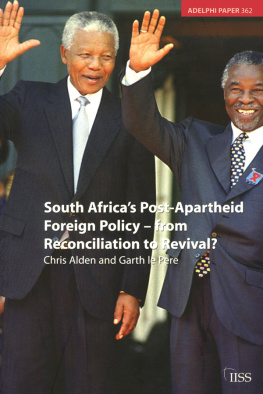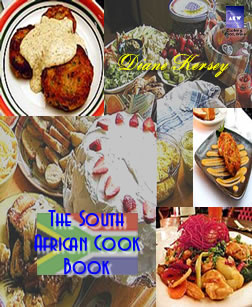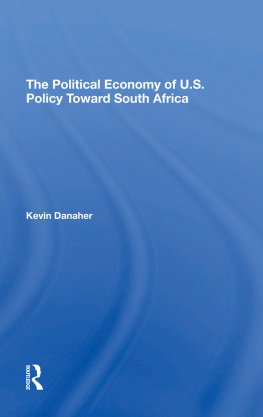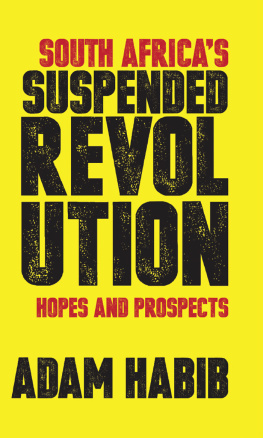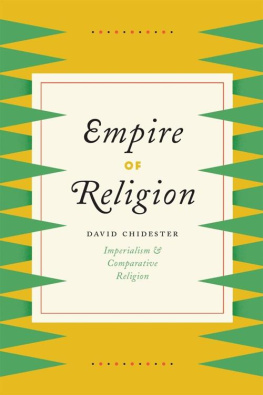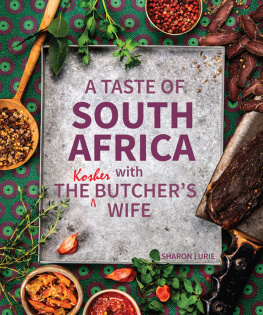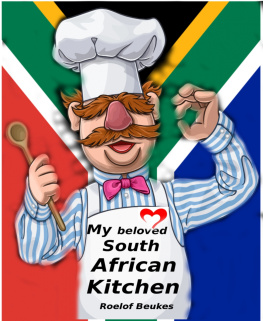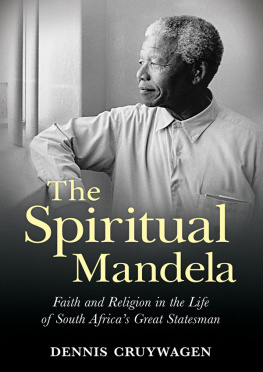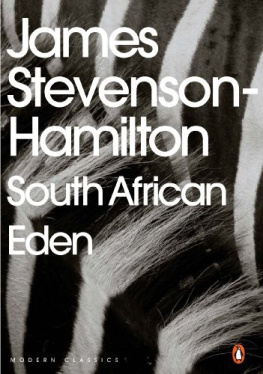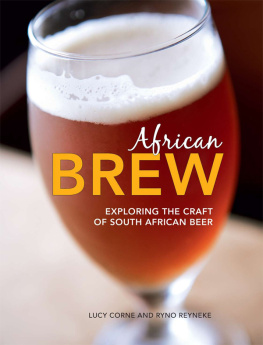Wild Religion
Wild Religion
Tracking the Sacred in South Africa
David Chidester

UNIVERSITY OF CALIFORNIA PRESS
Berkeley Los Angeles London
University of California Press, one of the most distinguished university presses in the United States, enriches lives around the world by advancing scholarship in the humanities, social sciences, and natural sciences. Its activities are supported by the UC Press Foundation and by philanthropic contributions from individuals and institutions. For more information, visit www.ucpress.edu.
University of California Press
Berkeley and Los Angeles, California
University of California Press, Ltd.
London, England
2012 by The Regents of the University of California
Library of Congress Cataloging-in-Publication Data
Chidester, David.
Wild religion : tracking the sacred in South Africa /
David Chidester.
p. cm.
Includes bibliographical references and index.
ISBN 978-0-520-27307-8 (cloth : alk. paper)
ISBN 978-0-520-27308-5 (pbk. : alk. paper)
1. South Africa--Religion. 2. Religion and sociologySouth Africa. 3. CultsSouth Africa. 4. Nativistic movementsSouth Africa. 5. Cultural pluralismSouth Africa. 6. South AfricaReligious life and customs. I. Title.
BL2470.S6C47 2012
200.968dc23
2011042261
Manufactured in the United States of America
20 19 18 17 16 15 14 13 12
10 9 8 7 6 5 4 3 2 1
In keeping with a commitment to support environmentally responsible and sustainable printing practices, UC Press has printed this book on Rolland Enviro100, a 100% post-consumer fiber paper that is FSC certified, deinked, processed chlorine-free, and manufactured with renewable biogas energy. It is acid-free and EcoLogo certified.
Contents
Preface
During 1999, while Cape Town was celebrating a festival, One City, Many Cultures, and hosting the Parliament for the Worlds Religions, the Cape Times published a series of profiles of religious communities, Christian, Muslim, Jewish, and Hindu, all living in the same city. On March 1, this series featured a profile of African traditional religion, the indigenous religious heritage of Africa, in an article, Going Back to Our Past with Praise.
Against the background of this Tswana emergence myth, which even identified the precise place of emergence as Lwe, forty
Perhaps Gogo had carefully read and assimilated the chapter on African religion in Religions of South Africa, repeating the words of that text in her interview for the Cape Times. I was surprised that she used the idiosyncratic term sacred specialists, which I had coined in that book for indigenous healers, diviners, and ritual experts. On careful reflection, however, I concluded from seeing my own words spoken by Gogo that I am Gogo. I relate this incident, therefore, not to accuse anyone of plagiarism, but to establish my credentials to speak about African religion. According to the Cape Times, I am an elderly African grandmother.
Tracking the sacred in South Africa from the advent of democracy in 1994 to the euphoria of the Football World Cup in 2010, Wild Religion explores indigenous African religion.
Under the designation African traditional religion, indigenous religion in Africa has been conventionally characterized by the basic elements of belief in God, veneration of ancestors, sacrifice, initiation, divination, and healing rituals. This inventory, as I have argued elsewhere, is a product of colonial containment and Christian theological appropriations of indigenous religion as preparation for the Gospel.elected to the democratic parliament, and was initiated as a sangoma, an indigenous sacred specialist. Even pure tradition can have a mixed and complex history.
Accordingly, my focus in this book is not on traditional uniformity or continuity but on wild, surprising creativity. We will see indigenous religion moving between rural and urban spaces to produce a migrating sacred, finding a home in the city by creating a hybrid sacred, and assuming national significance, from a ritual of purification on Robben Island in 1997 to a ritual sacrifice for the World Cup in 2010, as the spiritual dimension of an African Renaissance in South Africa. As a national resource, indigenous religion appears in Thabo Mbekis presidential legacy project, Freedom Park, and in Jacob Zumas appeal to Zulu traditionalism. But indigenous religion also appears in the wild religious creativity, not always in the national interest, displayed by prison gangs and urban criminals, by the global Zulu spirituality of neoshamans, and by the ancient Egyptian theosophy that has entered South Africas parliament.
Given the postapartheid national motto, Unity in diversity, Wild Religion also explores religious diversity in South Africa. We will see religious communities developing different mappings of sacred space, different engagements with the state, and different ways of mediating interreligious relations in a changing South Africa. As a benchmark in this history, the National Policy on Religion and Education, adopted in 2003, shifted South African schools from religious instruction to teaching and learning about religion, religions, and religious diversity. However, my focus in this book is not on religious communities as conventionally defined, anchored in churches, mosques, temples, and synagogues, but on religion as an open set of resources and strategies for negotiating a human identity, which is poised between the more than human and the less than human, in the struggles to work out the terms and conditions for living in a human place oriented in sacred space and sacred time. Accordingly, in this book the sacred is my focus.
The sacred, as I will argue, does not just fall out of the sky. It is produced through the labor of intensive interpretation and regular ritualization, which generates a surplus of meaning that is immediately available for appropriation, as people make the sacred their own, but is also vulnerable to contestations over who legitimately owns and operates the sacred.
As we will see, wild religion can be regarded as good or bad, but it is essentially all mixed up. Turning to tourism, we can get a sense
But some of the promises of religious tourism are even more problematic because they are self-involving, potentially desecrating, and strategically positioned in a specific historical narrative of national oppression and liberation. They are self-involving, especially for a self-interested tourist, who can pay a visit to a sangoma and have your fortune read with traditional methods. They are potentially desecrating, crossing boundaries of secret knowledge and sacred space, for a tourist who can enter a world of secret, sacred, and initiatory practices to study the circumcision procedures that Xhosa boys must go through to become men. And they are framed in a national narrative of redemption, in which religious tourists are invited to sit in the pews of a Dutch Reform Church and imagine the voices of the apartheid oppressors as they preached what they believed to be right.
A national narrative of oppression and liberation has been a recurring feature in representations of South African religion. While castigating the Dutch Reformed Church as apartheid oppressors, it has celebrated churches, mosques, temples, synagogues, and other religious formations for opposing apartheid, struggling for freedom, and contributing to postapartheid nation building. Wild Religion breaks the mold of that redemptive narrative by enabling the emergence of different stories about religion in South Africa.
Focusing on the dynamics of the sacred, I have kept in mind multiple audiences throughout this book. I have mainly held two kinds of readers in mindthose who are interested in religion but do not necessarily care about South Africa and those who care about South Africa but are not particularly interested in religion. At every moment, I have tried to speak to both. Nevertheless, I wonder: Who could not care about South Africa? Oprah Winfrey cares. Undergoing DNA testing in 2005, Oprah found that she was actually a Zulu, with deep ancestral Therefore, anyone who is interested in Oprah must also be interested in religion. Since everyone, all over the world, loves Oprah Winfrey, I trust that everyone will want to read this book about religion in South Africa.

